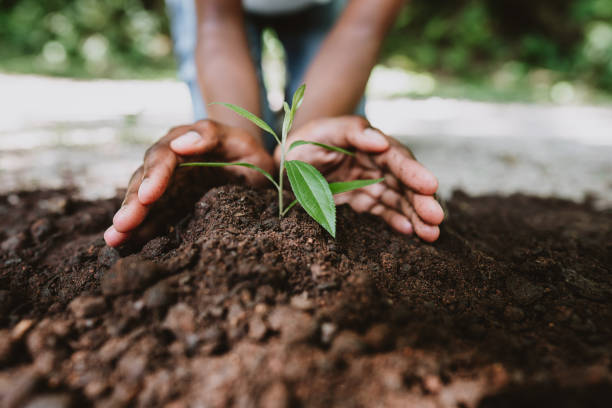Biodiversity is a term that resonates across various fields, yet many people may still wonder, what is biodiversity? At its core, it refers to the variety of life on Earth, encompassing different species, genetic variations, and ecosystems. This richness is not merely a backdrop to our existence; it plays a vital role in sustaining life as we know it. In this blog, we will explore the definition of biodiversity, its importance, ways to conserve it, the impact of climate change on Africa and why governments are increasingly focusing on carbon income.

What is Biodiversity?
To define this, we can break it down into three main components:
- Species Diversity: This aspect considers the variety of species within a given habitat or ecosystem. It includes everything from the smallest microorganisms to the largest mammals.
- Genetic Diversity: This refers to the variation of genes within a species. Higher genetic diversity allows species to adapt better to environmental changes.
- Ecosystem Diversity: This encompasses the variety of ecosystems within a region, including forests, wetlands, deserts, and oceans. Each ecosystem supports different species and processes.
Biodiversity means more than just a collection of living things; it represents the intricate relationships between these species and their environments.
Importance of Biodiversity
Understanding the importance is essential for appreciating its role in our world. Here are some key reasons why it is critical:
- Ecosystem Services: Biodiversity supports ecosystems that provide vital services, such as pollination of crops, purification of air and water, and regulation of climate. These services are fundamental to human survival.
- Food Security: A diverse range of species ensures a stable food supply. Different crops and livestock breeds offer resilience against pests and diseases, enhancing food security.
- Medicinal Resources: Many medicines are derived from natural sources, including plants and animals. The loss of biodiversity could jeopardize the discovery of new treatments.
- Cultural Significance: Biodiversity holds cultural importance for many communities. It shapes local traditions, spiritual beliefs, and practices, enriching human experiences.
- Economic Benefits: Biodiversity contributes to economies through agriculture, tourism, and sustainable resource management. Healthy ecosystems attract tourists and provide raw materials for various industries.

The Effect of Climate Change on Africa
Africa faces a unique set of challenges related to biodiversity, primarily driven by climate change. Rising temperatures, shifting rainfall patterns, and increased frequency of extreme weather events pose significant threats to the continent’s ecosystems. Here are some critical impacts:
- Habitat Loss: Changing climates can alter habitats, leading to the displacement of many species. As environments change, some species may not adapt quickly enough to survive.
- Species Extinction: Africa is home to a multitude of unique species, many of which are vulnerable to climate change. The loss of biodiversity means that once-thriving populations may face extinction.
- Food Insecurity: Agriculture, heavily reliant on stable climates, suffers under changing weather conditions. Crop yields may decline, exacerbating food insecurity across the continent.
- Water Scarcity: Climate change affects rainfall patterns, leading to droughts in some areas and flooding in others. This inconsistency threatens freshwater sources, impacting both human populations and biodiversity.
- Increased Human-Wildlife Conflict: As animals lose their habitats, they may encroach on human settlements, leading to conflicts that threaten both human lives and wildlife.
Ways to Conserve Biodiversity
The conservation of biodiversity is vital for ensuring the health of our planet and the well-being of future generations. Here are several effective strategies to promote its conservation:
- Protected Areas: Establishing national parks, wildlife reserves, and marine protected areas helps safeguard ecosystems and the species within them. These areas provide safe havens for wildlife and preserve critical habitats.
- Sustainable Practices: Encouraging sustainable agriculture, fishing, and forestry practices minimizes environmental impact. These methods ensure that natural resources are used responsibly without compromising biodiversity.
- Restoration Projects: Rehabilitating degraded ecosystems, such as reforestation and wetland restoration, can help restore biodiversity. These projects aim to revive ecosystems and create habitats for various species.
- Community Involvement: Engaging local communities in conservation efforts fosters a sense of ownership and responsibility. When communities understand the value of biodiversity, they are more likely to protect it.
- Legislation and Policy: Governments can implement policies that promote biodiversity conservation, such as protecting endangered species and regulating harmful activities like deforestation and pollution.
- Education and Awareness: Raising awareness about biodiversity and its importance can inspire individuals to take action. Educational programs can empower people to make environmentally conscious decisions.
Why Governments Are Focusing on Carbon Income
As climate change accelerates, governments are beginning to recognize the interconnectedness of biodiversity and carbon income. Carbon income refers to the financial benefits derived from carbon credits and offsets, which are essential for combating climate change. Here’s why this focus is critical:
- Mitigating Climate Change: Healthy ecosystems play a crucial role in carbon sequestration. Forests, wetlands, and oceans absorb significant amounts of carbon dioxide, helping mitigate climate change. By preserving biodiversity, governments can enhance these natural carbon sinks.
- Economic Opportunities: The carbon market offers economic incentives for protecting and restoring ecosystems. Governments can generate revenue through carbon credits, which can fund further conservation initiatives.
- International Agreements: Many countries are committed to international climate agreements, such as the Paris Agreement. Focusing on carbon income aligns with these commitments while also promoting biodiversity.
- Public Support: There is growing public awareness of the link between biodiversity and climate change. By emphasizing carbon income, governments can rally support for conservation efforts and sustainable practices.
Conclusion
Biodiversity is essential for the health of our planet and the well-being of all living beings. It provides vital ecosystem services, ensures food security, and supports cultural and economic activities. However, climate change poses significant threats to biodiversity, particularly in regions like Africa. To mitigate these effects, we must focus on conservation strategies, engage local communities, and recognize the importance of carbon income in addressing these challenges.
As I ponder the fate of our planet, I realize that the responsibility of improving biodiversity lies with each of us. We can make conscious choices—reducing waste, supporting sustainable products, and educating ourselves and others about the importance of biodiversity. By planting trees, creating wildlife-friendly spaces, and advocating for policy changes, we can contribute to a healthier planet. Together, we can be stewards of biodiversity, ensuring that future generations inherit a world rich in life and beauty.



